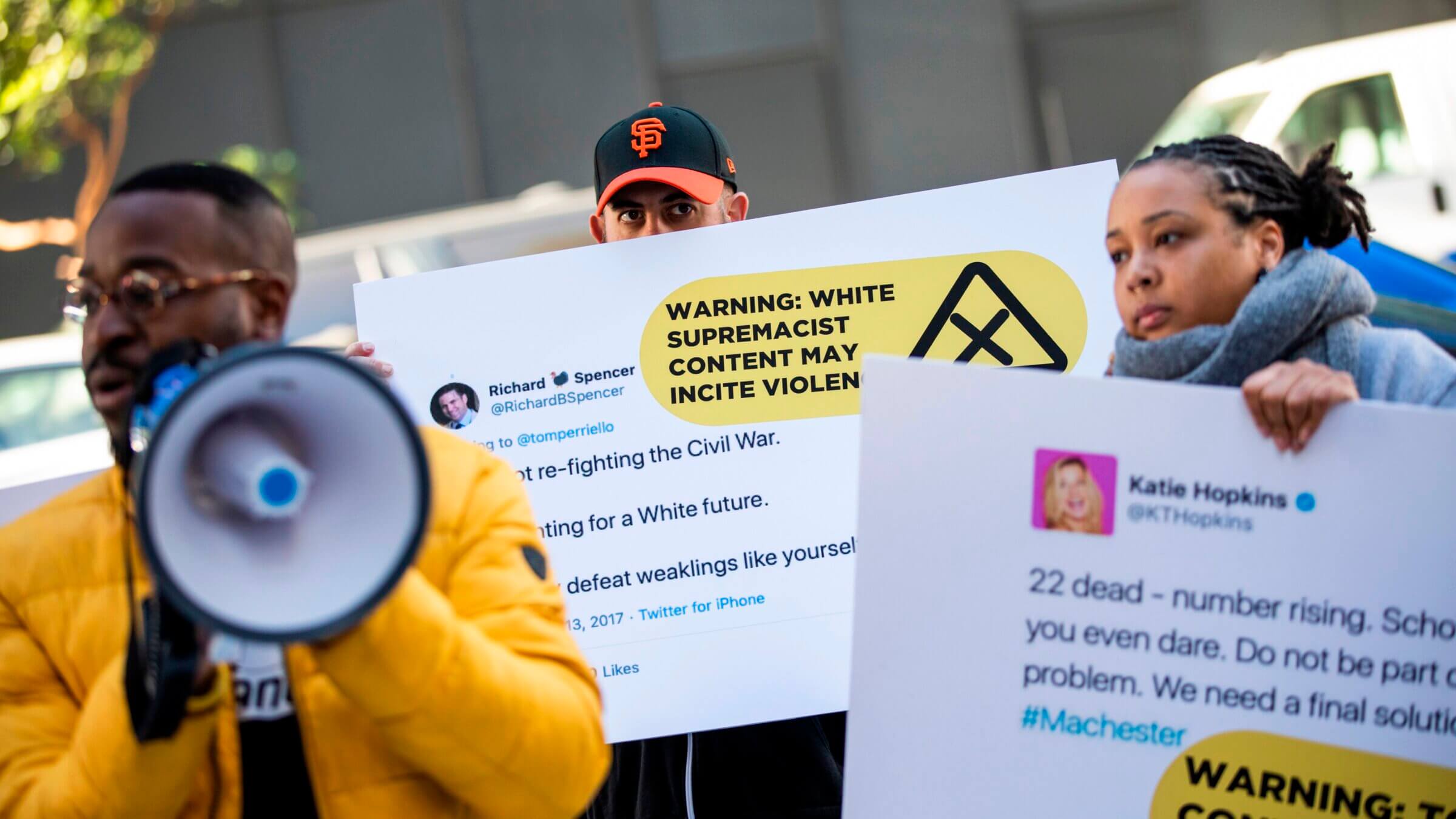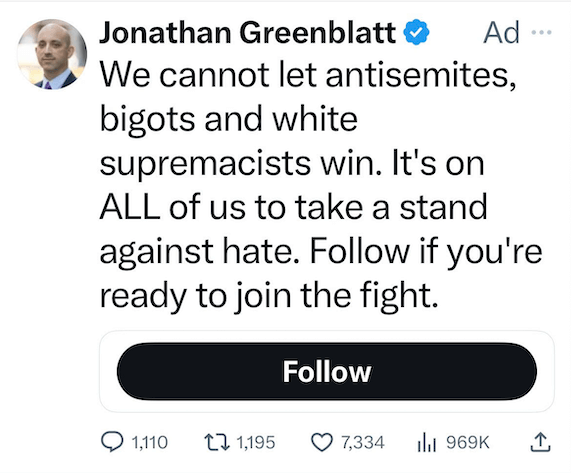The ADL called for advertisers to boycott Twitter. Now it’s advertising on Twitter.
The civil rights group called for advertisers to ‘pause’ spending last fall over concerns that the platform was failing to address hateful content, but says the boycott was always meant to be temporary

The Anti-Defmation League called for advertisers to pause spending on Twitter lat fall, after they failed to convince owner Elon Musk to address a series of policy concerns around hateful content. The company has long been a target of protesters, like those above who demonstrated outside Twitter’s headquarters in San Francisco in 2019. Photo by Getty Images
After the Anti-Defamation League failed to convince Elon Musk to address hateful content on Twitter last fall, the civil rights organization called for advertisers to stop spending money on the platform.
There is little indication that the ADL’s demands have been met. Yet the organization has restarted its own advertising on Twitter, promoting messages urging people to follow the ADL’s official account and entreaties from Jonathan Greenblatt, its chief executive.
“We cannot let antisemites, bigots and white supremacists win,” Greenblatt said in one paid July advertisement on Twitter. “Follow if you’re ready to join the fight.”
The ADL and a coalition of other organizations called Stop Hate For Profit announced their boycott last November, after Musk reinstated the account belonging to Donald Trump, the former president, and amid a flurry of antisemitic posts by Kanye West, the rapper who now goes by Ye.
“We are calling on advertisers to pause their spend globally until it becomes clear whether Twitter remains committed to being a safe place for advertisers as well as society overall,” the coalition said in a statement at the time.

It’s not clear when the ADL restarted its advertising on Twitter, which has rebranded as X. An ADL spokesperson declined to say if or when the call for a boycott ended.
“ADL’s stated intent was always for these actions to be a pause, and ADL recognized that some organizations — especially nonprofits and small businesses — may need to return to the platforms,” the spokesperson said. “ADL needs to be where the antisemites and extremists are, and when those bad actors are on a platform as large and influential as Twitter/X, we need to be able to reach people.”
The ADL has around 346,000 followers on Twitter and Greenblatt has 340,000.
The organization declined to say how much it was spending on Twitter, although the representative said that the platform represented “a small fraction” of its advertising budget. Twitter does not disclose details about advertisers, but the ADL spent approximately $30,000 on Facebook ads in July, according to Facebook’s ad database.
Coalition calling for Twitter boycott makes little progress
Stop Hate for Profit does not appear to have its own staff or any public contact information. Its last statement was the call for advertisers to boycott Twitter. Other prominent coalition members, including the NAACP and Color of Change, did not respond to requests for comment about the boycott.
But in November, Derrick Johnson, president of the NAACP, implored advertisers to stop using the website.
“In Elon Musk’s Twittersphere, you can incite an insurrection at the U.S. Capitol, which led to the deaths of multiple people, and still be allowed to spew hate speech and violent conspiracies on his platform,” Johnson said. “Any advertiser still funding Twitter should immediately pause all advertising.”
A separate coalition with a similar mission, called Stop Toxic Twitter, also called for a boycott.
Greenblatt has continued to fume over content policies on Twitter. Over the weekend, he called Musk’s decision to allow West back onto the website and award him a gold verification checkmark “absolutely sickening.”

Meanwhile, the ADL’s Center for Technology and Society has churned out a steady stream of research suggesting that Twitter is failing to reduce hateful content. “Twitter does not enforce its policies on antisemitism, even when flagged content openly incites violence,” the group noted in a May blog post.
It published a report the same month called “Threads of Hate: How Twitter’s Content Moderation Misses the Mark,” which found antisemitic comments flourishing in replies to posts from accounts reinstated by Musk.
The ADL spokesperson acknowledged that the organization remains deeply concerned about Twitter’s policies.
“Unfortunately, Twitter/X continues to move further down a dangerous path: They lack enforcement of their own policies, have decimated their Trust and Safety teams, dissolved the Trust and Safety Council, and continue to give once-banned extremists a massive platform,” the spokesperson said in an email. He also included 12 links to posts on Twitter in which the organization criticized the company.
Twitter continues to struggle with advertising revenue
Twitter has struggled to maintain advertising revenue following Musk’s takeover of the company in October. Several major corporations appear to have heeded the calls from the ADL and others to stop spending money on the platform. Media Matters for America, a progressive advocacy group, determined that 50 of Twitter’s top 100 advertisers had either announced or appeared to stop advertising on Twitter last November, around the time that the ADL announced their call for a boycott.
Stop Toxic Twitter found that Audi, Balenciaga, Best Buy, Capital One, Chipotle, Coca-Cola, Ford, Verizon and a number of other large companies had suspended advertising on Twitter.
The ADL has had a complicated relationship with other targets of its advocacy.
The organization launched an internal investigation of its education materials last September in response to a Fox News report that some of its materials intended for use by schools contained “far-left” material. The move came even as the ADL castigated the network for giving a prominent platform to Tucker Carlson, the far-right political pundit.
Fox canceled Carlson’s show in April. He announced a new program based on Twitter in June.
A message from our Publisher & CEO Rachel Fishman Feddersen

I hope you appreciated this article. Before you go, I’d like to ask you to please support the Forward’s award-winning, nonprofit journalism so that we can be prepared for whatever news 2025 brings.
At a time when other newsrooms are closing or cutting back, the Forward has removed its paywall and invested additional resources to report on the ground from Israel and around the U.S. on the impact of the war, rising antisemitism and polarized discourse.
Readers like you make it all possible. Support our work by becoming a Forward Member and connect with our journalism and your community.
— Rachel Fishman Feddersen, Publisher and CEO




























